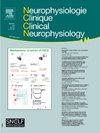Evaluating the efficacy of rTMS for the management of pain and psychological aspects in non-central nervous system cancer patients: a systematic review
IF 2.4
4区 医学
Q2 CLINICAL NEUROLOGY
Neurophysiologie Clinique/Clinical Neurophysiology
Pub Date : 2025-10-03
DOI:10.1016/j.neucli.2025.103110
引用次数: 0
Abstract
Objectives
Non-invasive brain stimulation techniques—particularly repetitive transcranial magnetic stimulation (rTMS) have emerged as promising alternatives to traditional pharmacological treatments for pain management in non-central nervous system cancer patients. By modulating neural circuits involved in pain processing through mechanisms of neuroplasticity, these interventions may also improve cognitive functioning, psychological aspects, and quality of life (QoL). The present systematic review aims to investigate the use of rTMS for cancer-related pain and psychological aspects.
Methods
A comprehensive search was conducted in three electronic scientific databases-PubMed, Scopus, and Embase. Six studies were identified and included, comprising pilot studies, randomized controlled trials, and one randomized clinical trial. PRISMA 2020 guidelines for systematic review were followed.
Results
All these studies investigated the use of rTMS to manage pain and psychological aspects such as QoL in patients with different types of oncological conditions, including breast, non-small cell lung, and gynecological cancer, multiple myeloma, and cell glioma. The results suggest a multidimensional improvement in QoL, well-being, and emotional dimension. Notably, a significant reduction in pain intensity was observed following rTMS treatment across all studies.
Conclusion
Although limited in number, current studies suggest that rTMS is a promising non-pharmacological intervention for managing cancer-related pain and enhancing psychological well-being. Further high-quality trials are needed to confirm these findings and establish standardized treatment protocols.
评价rTMS治疗非中枢神经系统癌症患者疼痛和心理方面的疗效:一项系统综述
目的:非侵入性脑刺激技术,特别是重复性经颅磁刺激(rTMS)已成为传统药物治疗非中枢神经系统癌症患者疼痛管理的有希望的替代方法。通过神经可塑性机制调节参与疼痛处理的神经回路,这些干预措施也可能改善认知功能、心理方面和生活质量(QoL)。本系统综述旨在探讨rTMS在癌症相关疼痛和心理方面的应用。方法在pubmed、Scopus和Embase三个电子科学数据库中进行综合检索。确定并纳入6项研究,包括初步研究、随机对照试验和1项随机临床试验。遵循PRISMA 2020系统评价指南。结果所有研究都调查了rTMS对不同类型肿瘤患者(包括乳腺癌、非小细胞肺癌、妇科癌、多发性骨髓瘤和细胞胶质瘤)疼痛和生活质量等心理方面的影响。结果表明,生活质量、幸福感和情感维度的多维度改善。值得注意的是,在所有研究中,rTMS治疗后疼痛强度显著降低。结论虽然数量有限,但目前的研究表明,rTMS是一种有希望的非药物干预方法,可用于治疗癌症相关疼痛和增强心理健康。需要进一步的高质量试验来证实这些发现并建立标准化的治疗方案。
本文章由计算机程序翻译,如有差异,请以英文原文为准。
求助全文
约1分钟内获得全文
求助全文
来源期刊
CiteScore
5.20
自引率
3.30%
发文量
55
审稿时长
60 days
期刊介绍:
Neurophysiologie Clinique / Clinical Neurophysiology (NCCN) is the official organ of the French Society of Clinical Neurophysiology (SNCLF). This journal is published 6 times a year, and is aimed at an international readership, with articles written in English. These can take the form of original research papers, comprehensive review articles, viewpoints, short communications, technical notes, editorials or letters to the Editor. The theme is the neurophysiological investigation of central or peripheral nervous system or muscle in healthy humans or patients. The journal focuses on key areas of clinical neurophysiology: electro- or magneto-encephalography, evoked potentials of all modalities, electroneuromyography, sleep, pain, posture, balance, motor control, autonomic nervous system, cognition, invasive and non-invasive neuromodulation, signal processing, bio-engineering, functional imaging.

 求助内容:
求助内容: 应助结果提醒方式:
应助结果提醒方式:


